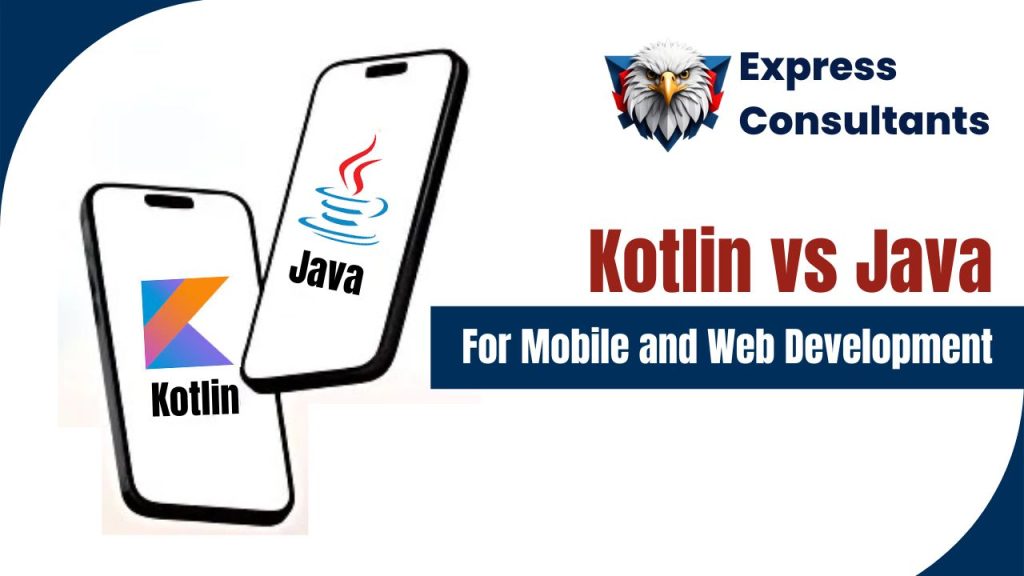
Kotlin vs Java for Mobile and Web Development
October 18, 2024Kotlin vs Java for Mobile and Web Development
When it comes to mobile and web development, choosing the right programming language is a decision that can make or break a project. With an overwhelming number of options, two contenders consistently stand out: Kotlin and Java. While both have their strengths, deciding between them depends on various factors, including project requirements, developer experience, and the specific platform—whether mobile or web. Let’s break down what makes these two languages tick and which might be the best choice for your development needs.
Overview of Kotlin
Kotlin’s rise in popularity has been nothing short of spectacular. Released by JetBrains in 2011, Kotlin was designed to address Java’s shortcomings, making it more modern and developer-friendly. It’s statically typed, supports both object-oriented and functional programming, and seamlessly integrates with Java. Kotlin is also the official language for Android development, making it a hot favorite among Android developers. Plus, its concise syntax and enhanced features like null safety and coroutines make coding in Kotlin a breeze, which is why developers love it.
But let’s be real – Kotlin isn’t just a tool to fix Java’s problems. It’s its own beast with features that make writing code fun again. For instance, it eliminates the infamous NullPointerExceptions that have haunted Java developers for decades. And honestly, who doesn’t want a bit less stress in their coding life, right?
Overview of Java
Ah, Java. The OG of programming languages, Java has been around since the mid-’90s and, despite Kotlin’s meteoric rise, it’s still going strong. In fact, Java is one of the most widely used languages in the world, powering everything from enterprise-level backend systems to Android apps. With its robust architecture and object-oriented approach, Java is known for being reliable, fast, and, well, everywhere.
Java’s strengths lie in its platform independence—write once, run anywhere (WORA)—and its massive ecosystem. Developers love Java because it’s mature and has a large community, making it easy to find resources, libraries, and frameworks to get things done. However, Java’s verbosity can be a bit of a pain. Compared to the slick and concise Kotlin, Java sometimes feels like you’re writing a novel when all you needed was a tweet.
Kotlin vs Java for Mobile Development
When it comes to mobile development, specifically Android, Kotlin vs Java is a debate that still sparks conversations. Since Google announced Kotlin as the official language for Android in 2017, its popularity has soared. Developers love Kotlin because it’s more expressive, reducing boilerplate code, which Java tends to produce in abundance. For example, what takes 20 lines in Java can often be written in just a few lines in Kotlin. This not only saves time but also reduces the potential for bugs, which every developer knows is a huge win.
Kotlin also comes with built-in support for coroutines, which makes handling asynchronous tasks a breeze. In comparison, Java developers need to rely on complex solutions like callbacks or external libraries such as RxJava. Kotlin’s ability to simplify these tasks gives it a definite edge when developing mobile applications.
However, Java still holds its own in mobile development. It’s stable, well-supported, and has decades of documentation and a massive pool of skilled developers. If you’re maintaining legacy Android apps, Java might still be your best bet because it’s deeply entrenched in the Android ecosystem. Moreover, Java is faster to compile than Kotlin in many cases, though the difference is often negligible in smaller projects.
Comparison of Kotlin and Java for Web Development
While both Kotlin and Java can be used for web development, the comparison here is less heated. Java, with its strong history in backend development, particularly in large-scale enterprise applications, continues to dominate the web space. Frameworks like Spring and Java EE are immensely popular and offer an excellent foundation for developing scalable, secure, and robust web applications.
Kotlin, on the other hand, is still relatively new to web development but is quickly gaining traction. Thanks to its full interoperability with Java, Kotlin can be used alongside Java frameworks like Spring, and many developers are starting to switch because Kotlin offers a cleaner and more expressive syntax. It reduces boilerplate code and makes working with APIs more fluid and less error-prone. Plus, Kotlin’s support for JavaScript through Kotlin/JS makes it a versatile choice for developers looking to create both the frontend and backend with a single language.
That said, if you’re diving deep into enterprise-level web development, Java might still be your go-to due to its maturity and ecosystem support. But if you’re looking for something modern with fewer lines of code and more developer-friendly features, Kotlin could be a refreshing change.
Pros and Cons of Using Kotlin
- Pros:
- Concise and easy-to-read syntax.
- Null safety reduces the chance of runtime errors.
- Full Java interoperability.
- Official language for Android, offering better tools and libraries.
- Supports coroutines for easier asynchronous programming.
- Cons:
- Slightly slower compilation times in certain cases.
- Smaller community compared to Java.
- Fewer libraries and frameworks, though it’s growing fast.
Pros and Cons of Using Java
- Pros:
- Established language with a huge community and ecosystem.
- Platform-independent (WORA), making it highly versatile.
- Strong support for enterprise-level applications.
- Faster compilation for larger projects compared to Kotlin.
- Cons:
- Verbose syntax, leading to more boilerplate code.
- Doesn’t natively support modern features like coroutines.
- More prone to null pointer exceptions without external handling mechanisms.
When to Choose Kotlin vs Java
So, when should you pick Kotlin over Java or vice versa? If you’re diving into Android development, especially for new projects, Kotlin is the clear winner. Its modern features, enhanced productivity, and Google’s official backing make it the smart choice. Plus, it integrates seamlessly with Java, so transitioning your existing Java projects to Kotlin is relatively easy.
Java, on the other hand, remains a solid choice for large-scale enterprise applications or maintaining existing codebases. If you’re working on a legacy system or need a highly reliable and battle-tested language, Java is your guy.
For web development, Java still reigns supreme in enterprise environments, but Kotlin is a growing contender, especially for those looking to innovate with cleaner, more efficient code.
Conclusion
At the end of the day, the choice between Kotlin vs Java boils down to the specific needs of your project. Kotlin’s modern features, cleaner syntax, and Android dominance make it an exciting choice for mobile developers, while Java’s maturity, reliability, and vast ecosystem keep it firmly in the race for both mobile and web development. If you’re starting a new Android project, give Kotlin a whirl; it might just make your development journey smoother and more enjoyable. However, if you’re knee-deep in enterprise web applications or legacy systems, sticking with trusty old Java might still be the smartest move.
Ready to choose between Kotlin and Java? It’s all about what fits your project’s needs best.
You may also like :-
- Kotlin vs Flutter: Which One is Better in 2024?
- Angular vs ReactJS: Which One is Better for Frontend Development Framework in 2024?
FAQ: Kotlin vs Java for Mobile and Web Development
1. What is Kotlin, and why is it popular for mobile development?
Kotlin is a statically-typed programming language developed by JetBrains, designed to be fully interoperable with Java. It became popular for mobile development after Google announced it as the official language for Android in 2017. Developers love Kotlin because of its concise syntax, null safety features, and ease of handling asynchronous tasks with coroutines, which significantly reduce the chances of runtime errors.
2. Why is Java still widely used for mobile and web development?
Java has been around since the mid-1990s and remains one of the most widely used programming languages. Its platform independence, strong community support, and rich ecosystem make it a favorite for both mobile and web development. Java is particularly valued for enterprise-level applications, stability, and robust performance. It’s still widely used in Android development, especially for maintaining legacy apps.
3. Which language is better for Android development: Kotlin or Java?
Both languages are suitable for Android development, but Kotlin is generally preferred for new projects because it simplifies many tasks, offers concise syntax, and has built-in null safety. Java is still a good choice, especially if you’re maintaining older codebases or need a language with a large, established community.
4. Is Kotlin faster than Java in terms of performance?
Java often compiles faster than Kotlin, especially in larger projects. However, Kotlin’s more concise code can make development faster overall by reducing the amount of boilerplate code. The performance difference is usually minimal, so developers often prioritize ease of use over raw compilation speed.
5. Can Kotlin be used for web development?
Kotlin can be used for web development, especially when combined with frameworks like Spring. Its full interoperability with Java allows developers to use Kotlin alongside Java-based frameworks. Kotlin/JS also enables Kotlin to be used for frontend web development, making it versatile across different platforms.
6. When should I choose Java over Kotlin?
If you’re working on maintaining a legacy Android app or building a large-scale enterprise web application, Java might still be the better choice. Its maturity, platform independence, and deep integration with enterprise-level systems make it ideal for large, complex projects.
7. Is it difficult to switch from Java to Kotlin?
No, it’s not difficult to switch from Java to Kotlin, especially since Kotlin is fully interoperable with Java. You can start by gradually introducing Kotlin into your Java codebase, making the transition smoother. Many developers find Kotlin easier to work with due to its simplified syntax and modern features.
8. What language should I learn first: Kotlin or Java?
If your focus is primarily Android development, learning Kotlin first is a smart choice because it’s the official Android language. However, learning Java first could provide a broader foundation, as it’s used in many other areas beyond mobile development, such as web, enterprise, and server-side applications.
Ready to unlock your business's potential with custom software
Contact Us


